Objects
Displaying 601 - 625 of 1096
| ObjectID | Object Description | |
|---|---|---|
| 2018.029.001 Badge, Identification |
This "Funeral Escort Badge" was worn by U.S. Representative James Falconer Wilson of Fairfield, Iowa. It entitled him to a seat on president Abraham Lincoln's funeral train. Content can be used with… Read More | 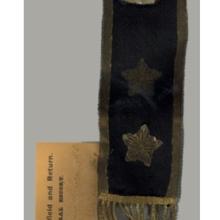
|
| 2018.029.002 Cradleboard |
Cradleboards like this one were used by many indigenous cultures in North America. The cradleboards allowed Native American women to take their children with them when they traveled and worked.… Read More | 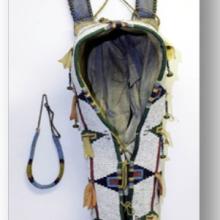
|
| 2018.029.003 Flag |
This flag was carried in a Wide Awakes rally held in Fairfield, Iowa. Close to 25,000 people attended the event. The flag displays the names of Abraham Lincoln and Hannibal Hamlin, the Republican… Read More | 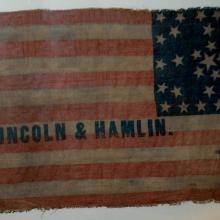
|
| 2018.029.004 Print, Photographic |
This is a photograph of the Jefferson Baseball Club from Fairfield, Iowa. The club was started in 1867, and it was one of the first baseball clubs in the state. Content can be used with the following… Read More | 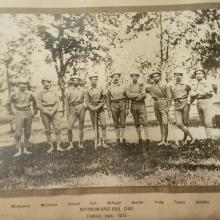
|
| 2018.030.001 Drum |
Both of these drums were used during the Civil War. The first was used by William C. Morse, who enlisted in the 100th Illinois Infantry in July, 1862 at the age of 36, to serve for three years.… Read More | 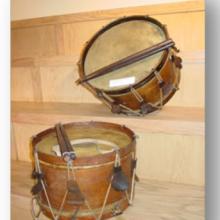
|
| 2018.031.001 Compass, Surveyor's |
This compass was used by a survey team that surveyed many areas of the Northwest Territory, including Iowa, in 1802. Content can be used with the following standards: 6th grade SS 6.23 Compare Iowa… Read More | 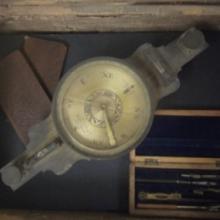
|
| 2018.031.002 Tombstone |
This is the grave of Becky the mule, who served in the American Civil War as an artillery transport mule for the Union Army. According to records, Becky was bought by Daniel Nelson at an auction in… Read More | 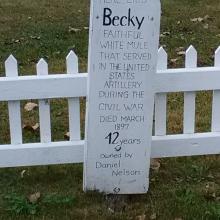
|
| 2018.031.003 Tombstone |
This is a tombsone for a mule named Jennie at the Mahaska County Historical Society. Part of the only known mule cemetery in the state of Iowa, Jennie was bought by Daniel Nelson at an auction in… Read More | 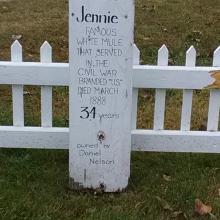
|
| 2018.031.004 Tomb |
This is the mule cemetery located at the Mahaska County Historical Society. It contains the graves of two mules who served as pack animals in the Union Army during the American Civil War, Becky and… Read More | 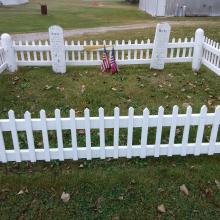
|
| 2018.032.001 Trunk |
Trunks like this one were used to carry a person's belongings as they traveled west. This trunk was large enough to hold a person's entire wardrobe. Content can be used with the following… Read More |
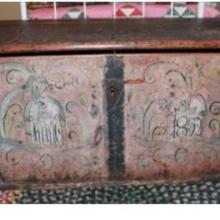
|
| 2018.033.001 Print, Photographic |
This is a photograph of Dr. George Charles Stockman. In 1908, Stockman met with architect Frank Lloyd Wright and convinced him to design a house for him and his wife, Eleanor. Wright designed the… Read More | 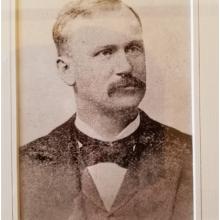
|
| 2018.033.002 Print, Photographic |
This is a photograph of Eleanor Chapin Stockman. In 1908, Chapman and her husband, Dr. George Charles Stockman, met with architect Frank Lloyd Wright and convinced him to build a house for them.… Read More | 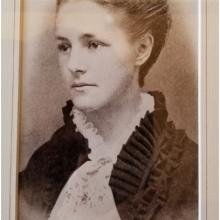
|
| 2018.033.003 Suite, Bedroom |
This oak furniture set, built during the 1880s, was originally used in Dr. George and Eleanor Stockman's daughter's bedroom. This bedroom was located in the house that architect Frank Lloyd Wright… Read More | 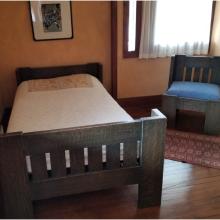
|
| 2018.033.004 Telephone, Wall |
This early 1900s telephone was located in the home that architect Frank Lloyd Wright designed for George and Eleanor Stockman of Mason City, Iowa. Telephones like this were among the first phones… Read More | 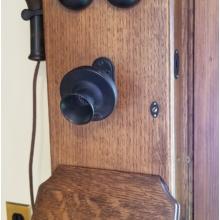
|
| 2018.033.005 Icebox |
Iceboxes such as this one served as early refrigerators. Large blocks of ice, usually taken from the river, were placed in the icebox and were replaced as they melted. Content can be used with the… Read More | 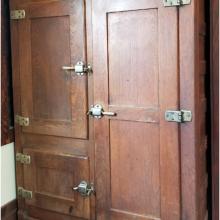
|
| 2018.033.006 Stove, Heating |
This cast-iron stove, located in the home of George and Eleanor Stockman in Mason City, Iowa, was one of the newest models available in 1910. The stove had a baking oven, six burners, two warming… Read More | 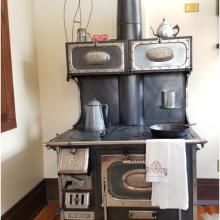
|
| 2018.033.007 House |
This photograph shows the Stockman House in Mason City, Iowa, as it appears today. George and Eleanor Stockman hired architect Frank Lloyd Wright to design this house for them in 1908. In 1989, the… Read More | 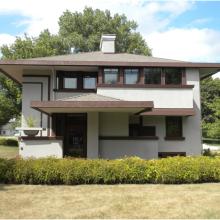
|
| 2018.034.001 Print, Photographic |
This is a photograph of Lieutenant Dale E. Christensen, a native of Gray, Iowa. Christensen joined the United States Army in 1940 and served during World War II with the 112th Cavalry Regiment. On… Read More | 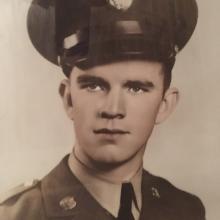
|
| 2018.034.002 Plow, Breaking |
This sod breaking plow was used by one of the first families to settle in Audubon County. Plows like this were used to prepare land for farming. After this plow was no longer used for farming, it… Read More | 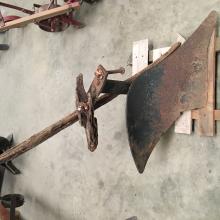
|
| 2018.034.003 Factory |
Near the end of the 19th Century, the Tramp Bros. Brickyard near Audubon, Iowa, served as one of Audubon County's leading industries. The brickyard manufactured bricks, drain tile, hollow building… Read More | 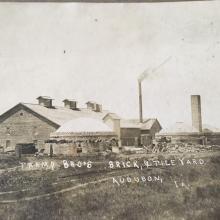
|
| 2018.034.004 Brick |
This brick came from the Tramp Bros. Brickyard in Audubon, Iowa. After it was founded in the 1880s, this brickyard served as one of Audubon County's leading industries. The brickyard manufactured… Read More | 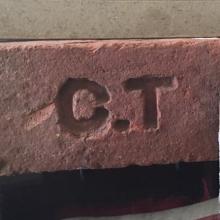
|
| 2018.034.005 Print, Photographic |
In July 1944, 25 German prisoners of war were moved from the POW camp near Clarinda, Iowa, to Audubon, Iowa. These prisoners helped construct a smaller POW camp that later housed between 100 and 125… Read More | 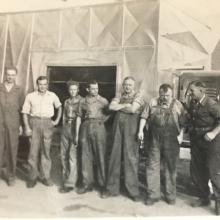
|
| 2018.034.006 Print, Photographic |
This photograph shows farmer Elmer G. Carlson of Audubon, Iowa. During the 1930s, Carlson participated in corn husking competitions across the Midwest. In each of these competitions, Carlson husked… Read More | 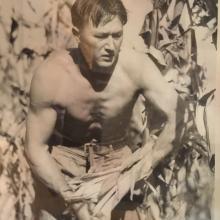
|
| 2018.034.007 Ring, Finger |
These rings were made for an Iowa woman named Elsie Madsen by a German POW who was being held at the Audubon, Iowa, skating rink. The rings were made from United States nickels. The Audubon POW camp… Read More | 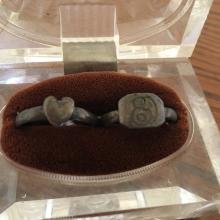
|
| 2018.034.008 Badge, Law Enforcement |
These badges were given to members of the Audubon County Militia, which was organized during World War II. On February 16, 1942, Audubon County Sheriff F. Clemmensen deputized six small town police… Read More | 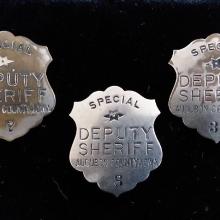
|
